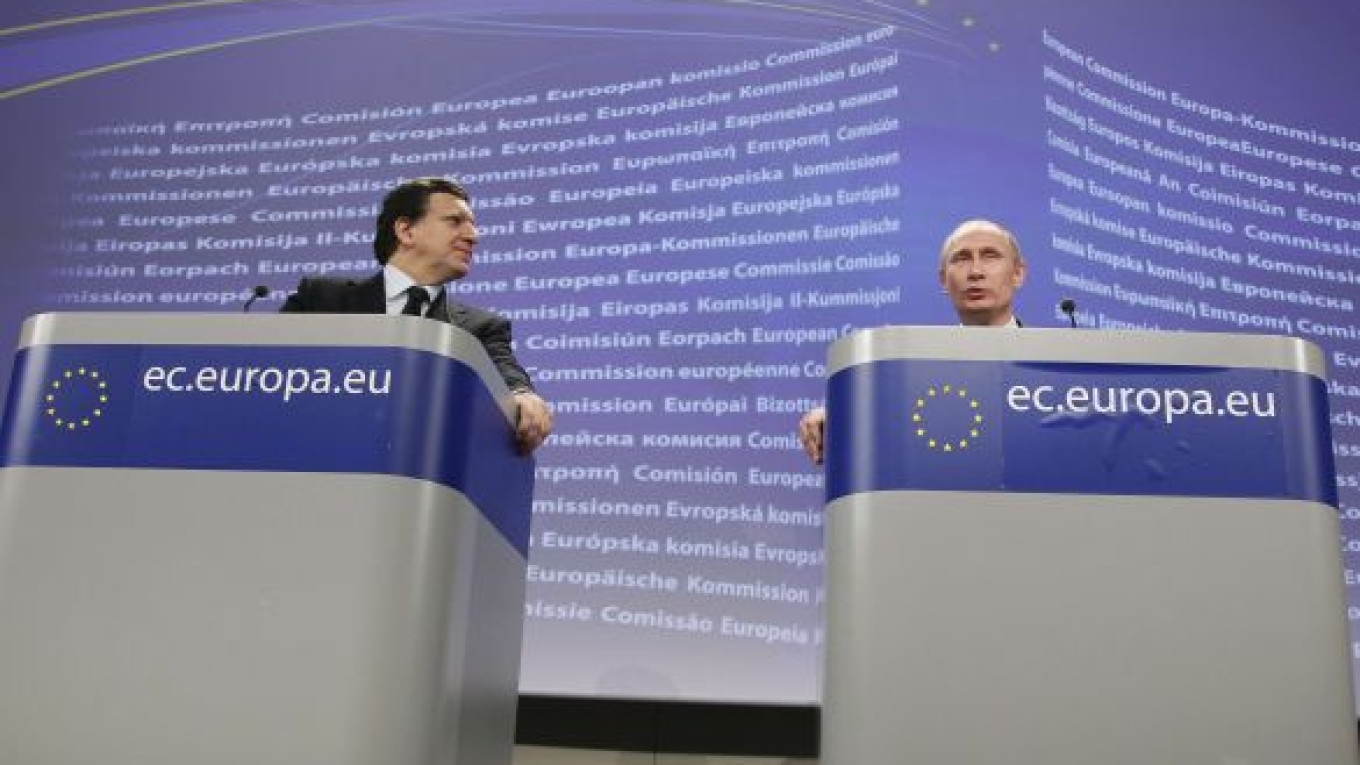BRUSSELS — Prime Minister Vladimir Putin and the president of the European Commission President, Jose Manuel Barroso, on Thursday clashed over EU plans to stop suppliers of oil or gas from directly managing pipelines — a move that threatens to hit Gazprom.
Putin said the plans could hurt his country's enterprises and likened them to "property confiscation."
But the EC president said the new energy framework was in line with World Trade Organization rules and would affect foreign and domestic companies alike.
Barroso said the so-called third energy package was "nondiscriminatory" and he ruled out any changes. For Europe, "this is now approved legislation," Barroso said at a news conference. "It applies to Russian companies as it applies to Norwegian companies … and it applies to European companies," he added.
The third energy package, which takes effect next month, aims to boost competition in the European gas market by separating gas production from pipeline management to prevent one company from controlling the entire supply chain in a country.
The package gives EU member states three options on how to deal with companies that both export gas to the EU and own a pipeline. The most drastic option would force a gas producer to sell its pipeline — a route only Lithuania has chosen so far.
A second option — picked by most countries — forces a gas producer to transfer the management of a pipeline to an independent entity, but allows them to continue owning it.
Under a third option, a gas producer could hold on to the pipeline, but would have to allow other companies to use it according to objective guidelines.
At the beginning of the news conference, which concluded a meeting between the European Commission and Russian government officials, Putin set out the stakes of EU-Russian relations. "Russian energy is the basis of European prosperity," he said.
Putin said the new plans would raise energy prices in the EU, as pipeline management would have to be handled by several smaller companies that would push up transportation tariffs to be profitable.
Europe is Russia's biggest market for gas, but Moscow has been concerned about Brussels' plans to diversify away from its supplies. Many EU countries, including all Baltic states, Slovakia and Finland, get all their gas from Russia, which in the past has cut off supplies amid disputes over pricing.
Despite Putin's belligerent tone, Energy Minister Sergei Shmatko appeared more conciliatory. "We do not object to the right of Europe to regulate its energy markets as it wants," Shmatko told journalists after the news conference, adding that he still sees some room for compromise.
"The process [of implementation of the energy package] has not been finished yet," he said, referring to Lithuania's decision to go for the most stringent option in the package.
Because the Lithuanian market is quite small, Gazprom might have a hard time getting a fair price for its pipeline if it is forced to sell.
Marlene Holzner, a spokeswoman for EU Energy Commissioner Günther Oettinger, said while the commission wouldn't interfere with Lithuania's implementation of the package, it might be able to help both parties find a solution that would leave Gazprom with a better price for its pipeline.
On some of Moscow's other demands, such as getting an exception to third-party access to connector pipelines to EU countries from its Nord Stream project, further compromise is impossible, Holzner said.
Putin also disappointed expectations of a clear commitment for Russia to join the WTO this year. Russia is the only major economy that is not yet part of the international free-trade body.
"Our objective is to finalize this work," Putin said of membership talks that have lasted nearly 18 years.
Barroso said he was "confident that it will be possible to come to a final deal with the WTO soon," but also shied away from naming a date.
Several Russian officials have said in recent months that 2011 will be the year the country finally signs up to the WTO, but it has been slow to implement some of the necessary reforms.
A Message from The Moscow Times:
Dear readers,
We are facing unprecedented challenges. Russia's Prosecutor General's Office has designated The Moscow Times as an "undesirable" organization, criminalizing our work and putting our staff at risk of prosecution. This follows our earlier unjust labeling as a "foreign agent."
These actions are direct attempts to silence independent journalism in Russia. The authorities claim our work "discredits the decisions of the Russian leadership." We see things differently: we strive to provide accurate, unbiased reporting on Russia.
We, the journalists of The Moscow Times, refuse to be silenced. But to continue our work, we need your help.
Your support, no matter how small, makes a world of difference. If you can, please support us monthly starting from just $2. It's quick to set up, and every contribution makes a significant impact.
By supporting The Moscow Times, you're defending open, independent journalism in the face of repression. Thank you for standing with us.
Remind me later.


